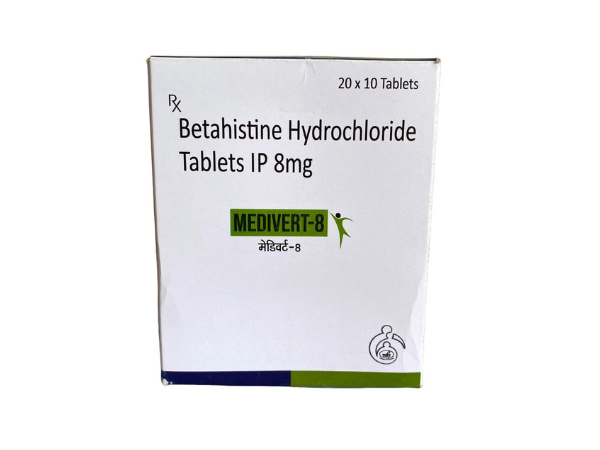- Betahistine is an antivertigo agent used for the reduction of episodes of vertigo association with Ménière’s disease.
The mechanism of action of betahistine is multifactorial. Ménière’s disease is thought to result from a disruption of endolymphatic fluid homeostasis in the ear. Betahistine mainly acts as a histamine H1-receptor agonist. The stimulation of H1-receptors in the inner ear causes a vasodilatory effect leading to increased permeability of blood vessels and a reduction in endolymphatic pressure; this action prevents the rupture of the labyrinth, which can contribute to the hearing loss associated with Ménière’s disease. Betahistine is also purported to act by reducing the asymmetrical functioning of sensory vestibular organs and increasing vestibulocochlear blood flow, relieving symptoms of vertigo
Need help? Call us:
+91 8097065229
Shopping cart (1)
Subtotal: ₹52.68
Spend ₹2,997.32 to get free shipping
Congratulations! You've got free shipping.
Menu
Categories
- Antiseptic
- Capsules and Tablets Loose Pack
- Aceclofenac
- Aceclofenac + Paracetamol
- Aceclofenac Paracetamol & Serratiopeptidase Tablet
- Amoxycillin
- Antacid
- Anti-Cold: Para 325mg + CPM 2mg
- Anti-Cold: Para 500mg + CPM 2mg
- Anti-Cold: Para+CPM+Phenylphrine
- Anti-Inflamatory (Analgesic)
- Ascorbic Acid (Vitamin C)
- Aspirin
- B-Complex
- Betamethasone
- Bisacodyl
- Bromhexin
- Cetrizine Tab
- Chloramphenicol
- Chloroquine Phosphate Tablet
- Chlorpheniramine Maleate (CPM) Tablets
- Ciprofloxacin
- Cough Suppresants
- Cyproheptadin Tablets
- Dexamethasone Tablets
- Diclofenac Tablets
- Dicyclomine Tablets
- Diethyl Carbamazine Citrate
- Digestive Enzyme
- Diphenhydramine Capsules
- Diphenhydramine Tablets
- Domperidone
- Doxycycline Capsules
- Etofyllin & Theophyllin Tablets
- Famotidine
- Folic Acid Tablets
- Frusemide Tablets
- Ibuprofen
- Ibuprofen + Paracetamol
- Iodochlorohydroxyquinoline Tablet
- Levocetrizine
- Loperamide
- Metochlopramide Tablets
- Metronidazole
- Nimesulide
- Nimesulide + Paracetamol
- Norfloxacin
- Ofloxacin
- Omeprazole
- Omeprazole
- Omeprazole + Domperidone
- Ondansetron Tablets
- Other Molecules
- Other Products
- Pantaprazole Tablets
- Pantaprozole + Domperidon
- Para + Diclo + Chlorzoxazone
- Paracetamol + Diclofenac
- Paracetamol 500mg Tablets
- Paracetamol 650mg Tablets
- Paracetamol Dispersible 125mg
- Pheniramine Maleate Tablets
- Piroxicam Capsules
- Piroxicam Capsules
- Prednisolone
- Prochlorpromazine Maleate
- Promethazine Tablets
- Salb
- Salb+Bromhex
- Sodamin
- Tetracycline Cap
- Trimethoprim & Sulphamethoxazole
- Vitamin B Complex Tablets
- Chlorhexidine Gauze Dressing
- Disinfectant
- Dressing Materials
- Absorbent Cotton Wool Roll
- Absorbent Gauz Sheet - 90cmx18mtr
- Adhesive Tape
- Chlorhexidine Gauze Dressing
- Cotton Crepe Bandage
- Cotton pad
- Elastic Adhesive Bandage
- Gamjee Roll - 4 inch x 3 mtr
- Gamjee Roll - 6 inch x 3 mtr
- Gauz Roll Bandage - 2 inch x 3 mtr
- Gauz Roll Bandage - 3 inch x 3 mtr
- Gauz Roll Bandage - 4 inch x 3 mtr
- Gauz Roll Bandage - 6 inch x 3 mtr
- Gauze Swab
- Micropaper Tape
- Paraffin Gauze Dressing
- POP Bandage
- Soft roll
- Health Supplements
- Injections
- a-B Arteether
- Adrenochrome Mono-Semicarbazone
- Amikacin Sulphate
- Aminophylline
- Amoxycillin +P-Clavulanate
- Artesunate
- Atropine Sulphate
- Calcium
- Cefoperazone + Sulbactam
- Cefoperazone + Tazobactam
- Ceftriaxone
- Ceftriaxone + Sulbactam
- Ceftriaxone + Tazobactam
- Cefuroxime
- Chloroquine Phosphate
- Chlorpheniramine Maleate Injections
- Cholecalciferol inj
- Citicoline
- Clindamycin
- Cyanocobalamin
- Dexamethasone Injections
- Dextrose
- Diclofenac Sodium - 1ml Inj
- Diclofenac Sodium - 3ml Inj
- Dicyclomine HCL Injections
- Domperidone
- Doxycycline Injections
- Drotaverine
- Enoxaparin Sodium
- Etofylline + Theophylline Injections
- Frusemide Injections
- Gentamicin Sulphate
- Hyaluronidase
- Hydrocortisone
- Hyoscine Butylbromide
- Ketorolac Tromethamine Inj
- Lignocaine
- Lignocaine + Adrenaline
- Magnesium Injection
- Meropenem
- Methylcobalamin
- Methylprednisolone - Discontinued
- Metochloproamide Injections
- Multi Vitamin
- Nandrolone Decanoate
- Ondansetron
- Ondansetron Injections
- Pantoprazole Injections
- Paracetamol + Lignocaine (MERCIN 75)
- Paracetamol Injections
- Pheniramine Maleate Injections
- Piperacillin + Tazobactam
- Piroxicam Injections
- Rabeprazole
- Ranitidin HCl
- Tranexamic Acid
- Triamcinolone Acetonide
- Vitamin B-Complex Injections
- IV Fluids
- Medical Devices and Health Monitors
- Baby Scale
- Bi-Pap
- Blood Glucose Meter
- Blood Glucose Test Strip
- Blood Lancet
- C-Pap Machines
- Dial BP Machine
- Digital BP Machine
- Disposable Speculum
- Fetal Droppler
- Mask and Accessories
- Mercurial BP Machine
- Nebulizer
- Needle Syringe Destroyer
- Pulse Oxymeter
- Steam Inhalers & Vaporizers
- Stethescope
- Thermometer
- Vein See
- Weighing Machine
- Minerals
- New Products
- Ointments Soaps and Powder
- Other Products
- Pharmacy
- Aceclofenac & Paracetamol Tablet
- Aceclofenac & Thiocolchicoside Tablets
- Aceclofenac Paracetamol & chlorzoxazone Tablet
- Aceclofenac Paracetamol & Serratiopeptidase Tablets
- Albendazole & Ivermectin Tablet
- Albendazole Tablets
- Amlodipine + Atenolol
- Amlodipine Tablets
- Amoxycillin 250mg Capsules
- Amoxycillin 250mg Dispersible Tablet
- Amoxycillin 500mg capsule
- Amoxycillin+Cloxacillin+Lactobacillus Capsules
- Amoxycillin+P.Clavulanate Tabltes
- Anti-Fungal
- Artemether+Lumefantrine Tab
- Aspirin Tablets
- Atenolol tablet
- Atorvastatin + Aspirin
- Atorvastatin Tablets
- Atorvastatin+Clopidogrel+Aspirin
- Azithromycin Tablets
- Baby Care
- Betahistine tablet
- Bisoprolol
- Cefadroxil + lactic Acid Bacillus Tablet
- Cefixime Tablets
- Cefixime+Azithromycin+Lactic Acid Bacillus Tablets
- Cefixime+Lactic Acid Bacillus Tablets
- Cefixime+Ofloxacin Tablets
- Cefpodoxime Proxetil+P.Clavulanate
- Cefpodoxime Tablets
- Cetirizine Tablets
- Chloroquine Phosphate Tablets
- Cholecalciferol
- Cilnidipine Tablet
- Ciprofloxacin Tablets
- Clopidogrel Tablets
- Clopidogrel+Aspirin Tablets
- Clotrimazole Powder
- Cough Lozenges
- Dapagliflozin Tablets
- Dapagliflozin+Metformin HCL Tablets
- Diclo + Para+ Serratiopeptidase
- Doxylamine Succinate and Pyridoxine HCL
- Enalapril Tablet
- Etamsylate Tablets
- Etoricoxib Tablets
- Etoricoxib+Paracetamol Tablets
- Etoricoxib+Thiocolchicoside Tablet
- Febuxostat Tablets
- Ferrous Ascorbate Folic Acid & Zinc Tablet
- Fexofenadine Hcl Tablets
- Glibenclamide +Metformin HCl Tablet
- Glibenclamide Tablets
- Gliclazide Tablets
- Gliclazide+Metformin Hcl Tablets
- Glimepiride Tablets
- Glimepiride+Pioglitazone Hcl+Metformine Hcl Tablets
- Glipizide + Metformin HCL Tablets
- Glipizide Tablets
- Health Supplements - Protein
- Hydroxychloroquine Sulphate Tablets
- Immunity Booster
- Itraconazole Capsules
- Ivabradine
- Ivermectin Tablets
- Lisinopril
- Loperamide
- Mefenamic Acid+Dicyclomine Hcl Tablets
- Mefenamic Acid+Paracetamol
- Metformin HCL Tablets
- Metformin HCL+Glimepiride + Voglibose
- Metformin HCL+Glimepiride Tablets
- Methylprednisolone Tablets IP
- Metoprolol Tablets
- Metronidazole Tablet
- Montelukast & Levocetirizine Tablet
- Montelukast Sodium & Fexofenadine HCL Tablet
- Multivitamin Capsules
- Neuropathic Tablets
- Nicorandril
- Ofloxacin Tablets
- Ofloxacin+Ornidazole Tablets
- Olmesartan Medoxomil Tablets
- Omeprazole+Domperidone Capsules
- Ondansetron
- ORS Powder
- Pantoprazole Tablets
- Pantoprazole+Domperidone Tablets
- Paracetamol Tablets
- Paracetamol+Nimesulide Tablets
- PEADIATRICS DROPS
- Pioglitazone Tablet
- Prebiotic & Probiotic Capsules
- Prednisolone Tablet
- Rabeprazole Sodium Tablets
- Rabeprazole Sodium+Domperidone Capsules
- Rabeprazole Sodium+Levosulpiride Capsules
- Rabeprazole+Domperidone Tablets
- Ramipril Tablets
- Ranitidine Tablets
- Rosuvastatin
- Silodosin & Dutasteride Capsules
- Sitagliptin Phosphate + Metformin Tablet
- Sitagliptin Phosphate Tablet
- Telmisartan Tablets
- Telmisartan+Amlodipine Tablets
- Telmisartan+Amlodipine+Hydrochlorothiazide Tablets
- Telmisartan+hydrochlorothiazide Tablets
- Teneligliptin Tablets
- Terbinafine Tablets
- Thiocolchicoside
- Thyroxine Tablets
- Trypsin Rutoside Trihydrate Bromelain & Diclofenac sodium
- Trypsin-Chymotrypsin
- valsartan 160mg
- Vildagliptin
- Vitamin Supplement
- Voglibose Tablets
- Protective Equipments
- Protective Kits
- Rehabilitation Aids
- Abdominal Belts & Braces
- Air Mattress
- Allied Product
- Ankle Supports
- Cervical Aids - Neck Collars & Pillows
- Compression Stocking
- Finger Splints
- Fracture Aids
- Knee Support
- Neoprene Products
- Physiotherapy
- Silicone & foot care product
- Sleeping Aids
- Traction Kits
- Walking Aids
- Wheel Chairs
- Wrist & Forearm Products
- Respiratory Products
- Senior Care
- Sterile Products
- Surgical Consumables
- Syringe & Needles
- 10ml PosiFlush
- 10ml Syringe with Needle
- 10ml Syringe without Needle
- 1ml Syringe with Needle
- 2.5ml Syringe with Needle
- 2.5ml Syringe without Needle
- 20Gx1 Needle
- 20ml Syringe with Needle
- 21Gx1 Needle
- 22Gx1 Needle
- 23Gx1 Needle
- 24Gx1 Needle
- 26Gx1.5 Needle
- 27Gx1.5 Needle
- 2ml Syringe with Needle
- 2ml Syringe without Needle
- 3ml Syringe with Needle
- 3ml Syringe without Needle
- 50ml Syringe without Needle
- 5ml PosiFlush
- 5ml Syringe with Needle
- 5ml Syringe without Needle
- Special Offers
- Syrups & Solutions
- Amoxycillin+P.Clavulanate Syrups
- Antacid Syrup
- Anti-Cold Syrup
- Cefixime
- Cefixime + Ofloxacin
- Cefpodoxime + Potassium Clavulanate
- Cepodoxime Syrup
- Cetrizine Syrup
- Cetrizine+Para+Phenylephrine
- CHOLECALIFEROL
- Citrate Solution
- Cough Expectorant (Jars)
- Cough Expectorant (Syrup Bottles)
- Cough Suppresant
- Enema
- Hunger Syrup
- Lactulose Solution
- Laxative
- Metronidazole Benzoate
- Ofloxacin+Metronidazole+Simethicone Syrup
- Para+Ibuprofen
- Paracetamol +Mefenamic Acid Syrup
- Paracetamol Syrup
- Promethazine Hydrochloride Syrups
- Rose Syrup
- Salb Syrup
- Sodium Phosphate
- Throat Pain
- Transfusion - IV Set Scalp Vein Set
- Uncategorized
- Urology
- Vitamin
Betahistine 8mg | Brand – Medivert-8 | Manufacturer – DM Pharma | Pack of 1X10Tabs
Brand:
8 people are viewing this product right now
₹60.00 ₹36.00
+ 12% GST
Shipping calculated at checkout.
Max Available Quantity: 9
Max Available Quantity: 9
Estimated delivery:4 days
SKU:
32279
Categories: Betahistine tablet
Have any Questions?
Feel free to Get in touch
Guarantee Safe and Secure Payment Checkout
Only logged in customers who have purchased this product may leave a review.
Related products
You may add any content here from XStore Control Panel->Sales booster->Request a quote->Ask a question notification
At sem a enim eu vulputate nullam convallis Iaculis vitae odio faucibus adipiscing urna.





Reviews
There are no reviews yet.